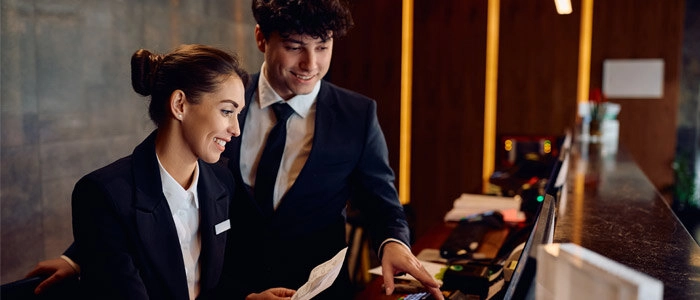
The EHL Insights Report: Hospitality Outlook 2025 takes an expert look at five key trends shaping the future of the hospitality industry.
Based on comprehensive research and expertise from EHL faculty members and the school’s extensive network of industry leaders, it offers a thoughtful perspective on where the industry is heading in the coming years. Through key insights and analysis, it aims to inspire innovation, emphasize human-centricity and collaboration, and enhance our industry, by equipping hospitality professionals with a clear understanding of emerging trends, opportunities, and challenges.
The Heart of Hospitality: Fostering Human Connection in the Age of AI
AI plays a pivotal role in the future of hospitality, projected to contribute $15 trillion to the global economy by 2030. In hospitality, AI streamlines routine tasks, allowing staff to focus on meaningful human interactions. AI isn’t about replacing workers but enhancing human-centric experiences.
The concept of “Hospitality Vibes” – the emotional energy conveyed by individuals and spaces – is gaining importance. Social connection, belonging, and community remain essential. Hospitality institutions can bridge AI and human connection, leveraging both to enhance guest experiences and create lasting impressions.
– Dr. Reza Etemad-Sajadi, Dr. Maggie Chen, Dr. Ming Tan

Revolutionizing Hospitality Branding: The Era of Personalization and Cross-Fertilization with Luxury Brands
Often indistinguishable from one another, hotels face intense competition, but personalization – with the help of AI and bridging with other industries – can set them apart. Anticipating guests’ needs enhances their experience, strengthening the hotel’s brand and deepening customer relationships.
Personalization, as seen in luxury brands, creates authentic positioning. “Cross-fertilization” between the hospitality and luxury sectors can result in mutually beneficial experiences. Hospitality services coupled with luxury collaborations or cross-fertilized with neighboring industries, are on the rise, transforming the hospitality industry and extending brands’ portfolios.
– Dr. Florent Girardin, Dr. Matthias Fuchs, Bernold Schröder

New Working Models: A Blueprint for Professional Well-Being through Modernization and Talent Management
Professional well-being is crucial, especially when industries are facing a shortage of skilled workers. In order to invest in the mental health of employees, companies need to provide purpose and financial stability, while also embracing new work models to reduce stress.
Using AI to automate operations can streamline repetitive tasks, so that employees can focus on more engaging work, enhancing professional well-being. Models such as job rotation – especially relevant post-COVID – build skills and satisfy Gen Z’s preferences. On the managerial front, clear job progression and cross-dimensional, network-based models are essential. Modernizing management systems is crucial for young employees who find outdated systems dissatisfying. The digital transformation will include AI-driven talent management systems, fostering a transparent, community-oriented approach, as well as training programs for older managers to bridge generation gaps, covering diversity, inclusion, and ethical issues.
– Dr. Stefano Borzillo, Satya Anand, Ian Millar

Rejuvenating and Transformative Experiences: The Rise of Well-Being Journeys in the Post-Pandemic Era
Due to the rise of mental health issues, people are longing for more meaningful travel experiences that can enrich their lives whilst also nourishing their mind, body, and soul. With this emerging trend, a journey becomes a transformative experience that can change the lives of travelers and help them reconnect with themselves through hospitality.
The range of well-being journeys and health trips on offer – such as digital detoxes, silent retreats, vacations in combination with meditation, yoga and Ayurveda – is constantly increasing and gaining in popularity. As travelers become more conscious of their physical and spiritual well-being, the demand for these health-oriented experiences is expected to grow, making them a central pillar of the hospitality industry.
– Dr. Valentina Clergue, Susie Ellis

A 360-Degree Approach to Sustainability: Thinking and Acting Eco-Friendly from A to Z
Sustainability extends beyond the environment to employee well-being and community engagement, with ripple effects for both companies and localities. For hotels and hospitality service operators it will become more important over the coming years, to invest in sustainable practices on a macro-level – from the customer experience to the well-being of employees, to their communities – all while ensuring sustainable and resource-conserving uses and practices.
In the evolving hotel industry and in the context of global climate change, sustainability emerges as a paramount concern for guests. Although travel itself presents sustainability challenges, hotels and hospitality institutions can adopt holistic measures to enhance the sustainability of their services, positioning themselves as responsible leaders in the ever-changing hospitality landscape.
– Dr. Carlos Martin-Rios, Dr. Isabella Blengini, Friederike Grupp
Download the EHL Hospitality Trends 2025 Report
